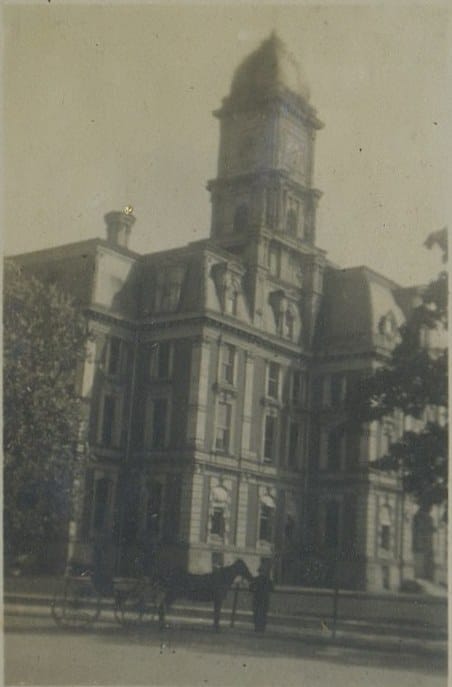 A “Highbrow” Event
A “Highbrow” Event
By: David Heighway, Hamilton County Historian
The courtroom in the old courthouse has been the site of many events, such as grave robbing trials, baseball trials, the founding of the Carnegie library, and the trial of D. C. Stephenson. However, in late November of 1916, a trial happened there that could best be described as “quirky” since it hinged on the definition of certain slang words.
The case was a libel suit brought by Edwards Daniels against Lemuel S. Todd. The two men involved were actually not from Noblesville, but the city had been chosen as a change of venue from Tipton County since both parties were involved in the courts there. It took place in the Circuit Court with a local jury and Judge Earnest E. Cloe presiding. It started on November 23 and ran for three days.
The case had come about because of a letter that Todd had written to the Tipton Tribune about improving the roads. Daniels, who was an attorney and secretary of the Tipton Chamber of Commerce, wanted to pave many of the roads with concrete. Todd, a gravel road contractor and large landowner, was opposed to concrete roads. In the letter, he said that the Chamber of Commerce should remain neutral on the issue, but that Daniels had some personal involvement in it. An article in the Ledger added “Todd also used some vigorous language in giving his personal opinion on Daniels”.
The language of the letter turned into one of the key points of the trial. In it, Todd had referred to Daniels as a “highbrow” and claimed that he got a “rake-off” from land sales. These words were fairly new in 1916 and no one was sure if they were libelous or not. The modern Webster’s dictionary says that the first use of “highbrow” was in 1903 and the first use of “rake-off” was in 1888. They weren’t in the Webster’s dictionary of the time, so their meaning was open to interpretation.
Part of the suspicion about meaning arose from Lemuel Todd’s personality. He was a unique and strong-minded individual. He had been in a running fight for years with the Tipton County Bar Association about being admitted to practice law. It eventually ended up before the Indiana State Supreme Court in the 1930’s. He lost the case, but it did cause a re-interpretation of the state constitution regarding how amendments would be adopted. The amendment relevant to his case was declared invalid.
Todd would go on to do things such as suing the publisher of the Kokomo Tribune for not printing a letter to the editor that he wrote, and offering legal advice to Bruno Richard Hauptmann, the man accused of the Lindbergh kidnaping in 1936.
In the 1916 libel trial, various experts were brought in to testify about the meaning of the words. Charles F. Patterson, the Superintendent of Tipton Schools said that the commonly accepted meaning of “highbrow” was “…insinuation of snobbery, reproach. A reference to an individual who considers his social standing above that of his fellow men, and a man who intellectually and in other ways thinks he is aloof from his friends”. He said “rake-off” meant “corrupt profit, embezzlement, or theft”.
After hearing the various experts, the jury had to reach their verdict. The Ledger said that Judge Cloe’s instructions to the Jury were “very exhaustive” and “That portion dealing with the freedom of the press amounted to almost a treatise on newspaper matter”. All of this must have been tough going for the jury members. They deliberated for 24 hours and, in the end, they were hopelessly deadlocked and unable to reach a decision. The judge then discharged them. No one was happy about this, but the case went no further.
So, the next time you read about a court case that seems petty, remind yourself that Hamilton County once had a case that asked if calling someone “highbrow” was an insult.
